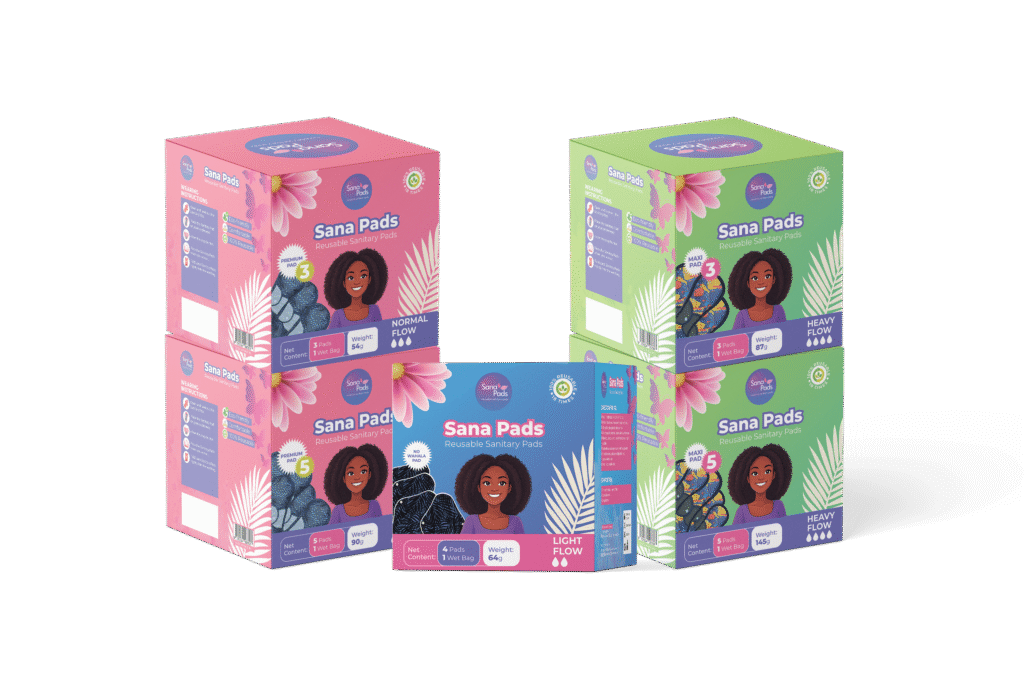Disposable vs Reusable Pads: The Complete Guide for Nigerian Women and Wholesale Buyers
Khadija was 15 when she got her first period during WAEC exams in Kano. With no money for pads and her mother struggling to feed the family, she used old clothes and missed three days of her final exams. “I thought my education was over,” she recalls. “I couldn’t focus on anything except staying clean and hiding the shame.”
Today, Khadija is a university graduate and youth advocate. Her story changed when a local NGO introduced reusable pads to her school. “Those pads didn’t just help me finish secondary school—they gave me back my dignity and my future.”
For millions of Nigerian women and girls, the choice between disposable and reusable pads isn’t just about preference—it’s about health, education, finances, and dreams. Whether you’re a mother trying to manage household expenses, an NGO looking to make real impact, or a distributor serving your community, understanding this choice can transform lives.
Understanding Your Options - Disposable vs Reusable Pads
What Are Disposable Pads?
Disposable pads are the single-use sanitary products most Nigerian women know. Made with synthetic materials, chemicals, and plastic backing, they’re designed to be thrown away after one use. Popular brands like Always, Molped, and Sure Care line pharmacy shelves across Lagos, Abuja, and beyond.
These pads work by absorbing menstrual flow into their synthetic core, but they come with hidden costs that go far beyond the purchase price.
What Are Reusable Pads?
Reusable pads are washable, long-lasting alternatives made from natural materials like bamboo fibers and soft cotton. Unlike disposables, they’re designed to last for years with proper care.
High-quality reusable pads—like those made by Sana Pads—combine several layers of absorbent material that move liquid away from your skin and lock it in. That means no chafing, no plastic irritation, and no monthly panic about running out of supplies. Each pad typically includes a waterproof layer and multiple absorbent layers, providing 8-12 hours of protection even for heavy flows.
The Real Cost Comparison - What Nigerian Women Actually Pay
Disposable Pads: The Hidden Monthly Expense
Let’s talk numbers that hit close to home. In Nigeria today, a pack of quality disposable pads costs between N700-N1,200. The average woman needs 0.5-2 packs monthly, meaning she spends up to N2,500 every month just on period products.
For a mother with two teenage daughters, that’s N5,000-N10,000 monthly—or N60,000-N120,000 annually. In a country where average wage is N30,000 monthly, this represents a massive household expense that many families simply cannot afford.
Consider Fatima from Ilorin, a single mother of three girls. “I was spending nearly N8,000 every month on pads for my daughters and myself. Some months, I had to choose between buying pads or rice for dinner. My girls would stay home from school because we couldn’t afford both.”
Reusable Pads: The Investment That Pays Back
A complete set of reusable pads costs between N3,000-N15,000 upfront—roughly what many families spend on disposables in 3-4 months. But here’s the difference: those reusable pads last 2-3 years with proper care.
Let’s break down the real savings:
- Disposable pads: N130,000 over 3 years for one person
- Reusable pads: N5,000 one-time cost for 3 years
- Your savings: Over N125,000 per person
For families, schools, and NGOs, these numbers are life-changing. That’s money that can go toward school fees, business investments, or reaching more girls with period dignity programs.
How it works
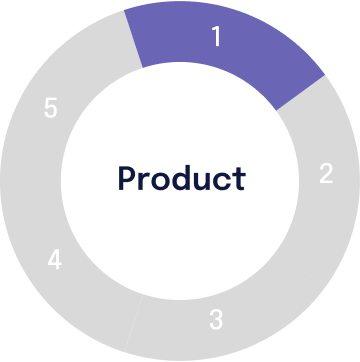
At Sana Pads, we use carefully selected materials to ensure comfort and reliability. Each pad includes a leak-proof layer for maximum protection and bamboo fibers for superior absorbency. Unlike polyester, bamboo is naturally odor-resistant and gentle on the skin, keeping you comfortable and fresh throughout the day. Our pads provide dependable, eco-friendly protection you can count on.

Production
Sana Pads are produced in Nigeria and are compliant with NAFDAC requirements.
All pads are inspected by our quality control team and afterwards sanitized before they are sold.

Sana Pads are designed for easy care without a washing machine. After use, simply rinse the pad in water, then hand wash with a mild soap.
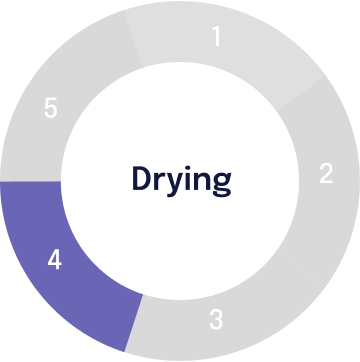
For freshness and hygiene, sun-dry Sana Pads after washing. The sun’s UV rays naturally disinfect and remove odors, keeping your pads soft and ready for reuse. It’s an easy, eco-friendly drying method that ensures long-lasting comfort.
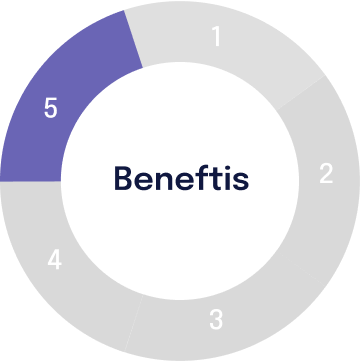
Sustainable, chemical-free, low-cost & low stress
Sana Pads are crafted to be sustainable, safe, affordable, and easy to use. Made from eco-friendly materials, they’re designed for reusability, helping you reduce waste. Free from harsh chemicals, they’re gentle on the skin, offering comfort without irritation. Their reusable nature keeps costs low, making them a smart, long-lasting choice for your cycle.
Health and Hygiene - Which Is Actually Safer?
Chemical Concerns in Disposable Pads
Here’s what many Nigerian women don’t know: disposable pads contain chemicals that can harm your body. When you eat something unhealthy, your stomach breaks it down and filters out toxins. But on your skin, there are no such filters—chemicals go directly into your bloodstream.
Many disposable pads contain synthetic fragrances, bleaches, and super-absorbent polymers that can cause:
- Skin irritation and rashes
- Allergic reactions
- Disruption of natural pH balance
- Increased infection risk
Remember the #MyAlwaysExperience campaign that went viral across Africa? Nigerian women shared stories of burns, rashes, and infections from popular disposable brands. These aren’t isolated cases—they’re symptoms of a larger problem with chemical-heavy period products.
The Natural Advantage of Reusable Pads
Reusable pads made from natural materials like bamboo and organic cotton are gentler on your body. They’re hypoallergenic, chemical-free, and allow better airflow—reducing the risk of infections and discomfort.
“I used to get rashes every month from disposable pads,” shares Blessing, a student at University of Lagos. “Since switching to reusable pads, I haven’t had a single infection. They’re so much more comfortable, and I don’t worry about chemicals affecting my health.”
Quality reusable pads are actually more hygienic when properly maintained. They don’t trap moisture against your skin like plastic-backed disposables, creating a healthier environment for your body.
Environmental Impact - Your Choice Affects Nigeria's Future
The Waste Problem with Disposables
Every disposable pad takes up to 800 years to decompose. In Nigeria, where waste management systems are already overwhelmed, this creates a serious environmental crisis.
Think about it: one woman uses approximately 11,000 disposable pads in her lifetime. Multiply that by Nigeria’s 100 million women and girls, and we’re looking at over 1 trillion pads ending up in our environment—in gutters, rivers, and landfills across Kano, Port Harcourt, and every Nigerian city.
These pads don’t just disappear. They clog drainage systems during rainy season, pollute waterways that communities depend on, and create breeding grounds for disease-carrying pests.
How Reusable Pads Help the Environment
Every woman who switches to reusable pads prevents thousands of disposable pads from polluting Nigeria’s environment. It’s a simple choice that creates massive impact.
Sana Pads has already prevented over 122,688 disposable pads from entering Nigerian landfills—and we’re just getting started. When you choose reusable, you’re not just helping yourself; you’re contributing to a cleaner, healthier Nigeria for future generations.
Local production of reusable pads also supports Nigerian jobs and reduces dependence on imported disposable products, contributing to economic sustainability alongside environmental protection.
Our Reusable Sanitary Pads
Light Flow
Thinner and ligher pad designed for
the last days of your period.
Contains leakproof layer at the back.

Normal Flow

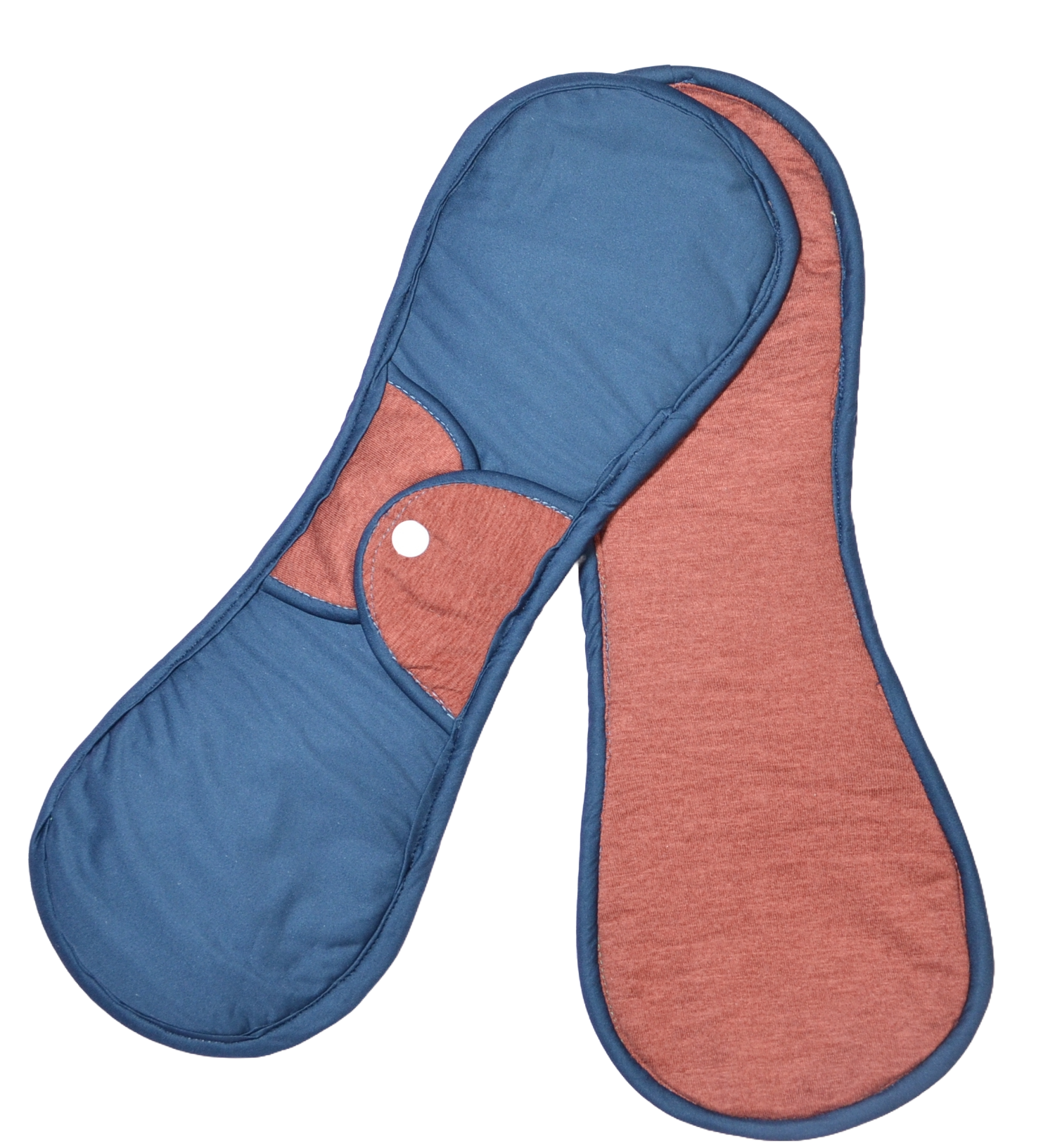
Practical Considerations for Daily Use
Convenience Factor
“But aren’t reusable pads inconvenient?” This is the most common question we hear, especially from school girls and working women.
The truth is, reusable pads are actually more convenient once you get used to them. You never run out unexpectedly, never worry about finding a shop open during emergencies, and never stress about having enough money for next month’s supply.
For school girls especially, reusable pads mean freedom. No more missing classes because there’s no money for pads. No more anxiety about leaking through inferior products your family can afford.
Maintenance and Care
Caring for reusable pads is simpler than many people think. Here’s the straightforward process:
Immediate care: Rinse with cold water right after use. Hot water sets stains, so always use cold.
Washing: Machine wash or hand wash with mild detergent. No special products needed—regular soap works perfectly.
Drying: Air dry in sunlight when possible. Nigeria’s climate is actually perfect for drying reusable pads quickly and naturally.
Storage: Keep clean, dry pads in a breathable pouch or drawer.
With proper care, each pad lasts years while maintaining its absorbency and comfort. Many Nigerian women report using the same set of reusable pads for over three years with excellent results.
What Nigerian Women Are Saying - Real Experiences
Across Nigeria, women and girls are discovering the life-changing benefits of reusable pads. Here are their real stories:
Aisha from Zaria: “I’ve been using reusable pads for over a year now. They’re more comfortable than disposables, and I love that I’m not spending money every month. My period used to stress me financially—now it’s just a normal part of life.”
Grace from Owerri: “My daughter was missing school every month because we couldn’t always afford pads. Since we got reusable pads from an NGO program, she hasn’t missed a single day. Her grades have improved, and she’s more confident.”
Maryam from Kano: “I was skeptical at first—how could cloth pads work as well as the ones from the pharmacy? But they actually work better. No more rashes, no more worrying about running out, and the money we save helps with other family needs.”
These aren’t exceptional cases—they’re becoming the norm as more Nigerian women discover the practical benefits of making the switch.
Leak-proof
Test
Experience Unmatched Absorbency and Comfort with Sana Pads. In this video, we showcase the incredible absorbency and leakproof capabilities of our reusable sanitary pads, proving why they are the most reliable in Africa.
For Wholesale Buyers and Distributors
Meeting Community Needs
If you’re an NGO, school administrator, or community leader, reusable pads offer unique advantages for large-scale period dignity programs:
Long-term impact: Instead of providing temporary relief, you’re giving women and girls a solution that lasts years.
Cost effectiveness: Your budget reaches more people and creates lasting change.
Community empowerment: Many reusable pad programs include training women to produce their own pads, creating local economic opportunities.
Measurable results: Easier to track impact when recipients have long-lasting products rather than monthly distributions.
Working with Sana Pads
At Sana Pads, we understand that bulk buyers have different needs than individual consumers. That’s why we offer:
Large wholesale discounts: Significant price reductions for bulk orders—contact us to discuss rates that fit your program budget.
Quality assurance: Every pad meets international standards for absorption, durability, and hygiene.
Educational support: We provide training materials and can conduct workshops on proper use and care.
Flexible ordering: Whether you need 50 pads or 5,000, we can accommodate your program’s scope.
Local production: Supporting Nigerian jobs while ensuring quality control and faster delivery.
Our wholesale programs have supported NGOs, schools, and government initiatives across multiple states, helping them achieve greater impact with their limited budgets.
Testimonials
Women around the world patronize Sana

“Buying disposable pads every month really added up, so I thought I’d give Sana Pads a try. I was surprised by how soft they are, and they work well for long days at university.
Washing them is simple, and I haven’t had to buy new pads in months, which has saved me money. I also like that they’re more eco-friendly. It feels good to have an option that’s both affordable and better for the environment.”
Women around the world patronize Sana

At first I felt irritated using a washable sanitary pads,I decided to give it a try and to my greatest surprise,it was very comfortable and very easy to wash, you can even go about your daily activities without fear of getting blood stain in public, I wanna say a Big shout out to SANA PADS!!
Divine Favour Eweka
Women around the world patronize Sana

I’ve tried several pad brands over the years, but Sana pads truly stands out. From the first use, I noticed the difference — soft on the skin, super absorbent, and incredibly comfortable. Even on my heaviest flow days, Sana pads holds up so well. What I also love is how breathable and skin-friendly the material is. If you’re looking for a pad that combines comfort, reliability, and quality, I highly recommend giving Sana pads a try.
Racheal Tarttive
Women around the world patronize Sana

I’m absolutely loving Sana reusable pads! They make me feel so relaxed and at ease during my periods. Plus, they’ve significantly reduced the cost and stress of buying disposable pads every month. Kudos to Sana for creating such an amazing product – I’m a forever fan!
Florence Kigbu
Women around the world patronize Sana
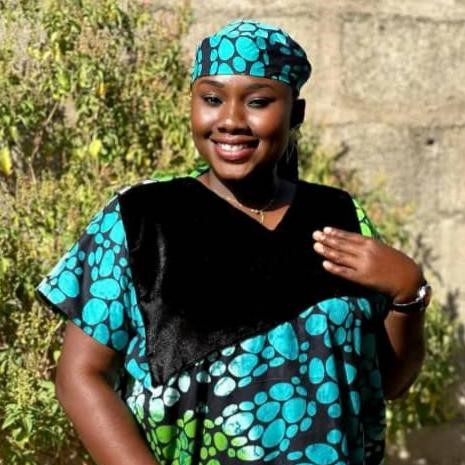
Sana Pad is very good, makes u feel comfortable and free, i love the pads the best ever!.
Susan Eweka
Women around the world patronize Sana

Sana pads have been a game-changer for me! Comfortable, eco-friendly, and cost-effective, they’ve given me confidence and peace of mind during my periods. No more worries about leaks or waste – Sana’s got me covered! Highly recommend!
Blessing Augustine David
Women around the world patronize Sana

I’ve tried several reusable pad brands, but Sana stands out for its exceptional quality, comfort, and durability. The design is thoughtful, and the materials are gentle on my skin. Switching to Sana has not only reduced my environmental footprint but also saved me money in the long run. I’m grateful for this sustainable solution!
Blessing Madubuike
Making the Right Choice for Your Situation
When Disposables Might Work
We believe in honest conversations about menstrual health. There are specific situations where disposable pads might be practical:
- Transition period: Some women prefer using disposables while learning to care for reusable pads
- Travel emergencies: Having a few disposables as backup during long trips
- Medical situations: Specific health conditions that require immediate disposal
However, these represent temporary needs rather than long-term solutions.
Why Many Are Choosing Reusable Sanitary Pads
The trend toward reusable pads isn’t just about saving money—it’s about taking control. Women who make the switch report feeling more empowered, more comfortable, and more confident about their menstrual health.
For wholesale buyers, reusable pads align with sustainable development goals, create lasting community impact, and provide better value for program investments.
Getting Started with Reusable Pads
How to Choose the Right Type
Not all reusable pads are created equal. Here’s what to look for:
Material quality: Natural fibers like bamboo and organic cotton provide better absorption and comfort.
Layer construction: Multiple absorbent layers with waterproof backing prevent leaks.
Size options: Different flows require different pad sizes—ensure you have options for light, regular, and heavy days.
Local production: Supports your community and ensures better quality control.
Starter Kit Recommendations
For individuals trying reusable pads for the first time, we recommend starting with a basic kit containing:
- 3-4 regular flow pads
- 1-2 heavy flow pads
- 1 waterproof storage pouch
- Care instruction guide
This provides enough pads for a complete cycle while learning the maintenance routine.
For wholesale buyers, consider starter kits that include educational materials about menstrual health alongside the pads themselves.
Empowering Choices for Nigerian Women
The choice between disposable and reusable pads represents more than a personal preference—it’s about the kind of future we want to create for Nigerian women and girls.
When we choose reusable pads, we choose:
- Economic empowerment: Families save money that can be invested in education, business, and other priorities
- Health dignity: Chemical-free, comfortable protection that doesn’t compromise well-being
- Environmental responsibility: Reducing waste and supporting sustainable practices
- Educational opportunity: Ensuring girls stay in school and reach their full potential
For wholesale buyers and distributors, partnering with quality reusable pad manufacturers like Sana Pads means supporting proven solutions that create lasting impact in Nigerian communities.
The girls and women in your community deserve period products that protect their health, support their dreams, and respect their dignity. Reusable pads deliver on all three.
Ready to make a difference? Whether you’re considering reusable pads for yourself, your family, or your community program, the first step is getting accurate information and quality products.
Contact Sana Pads today to learn about our wholesale discounts and discover how reusable pads can transform your community’s approach to menstrual health. Because every Nigerian woman deserves period dignity that lasts.
Together, we’re not just changing periods—we’re changing lives.https://sanapads.com/contact-us/

Author: Margaret Ochegbudu

